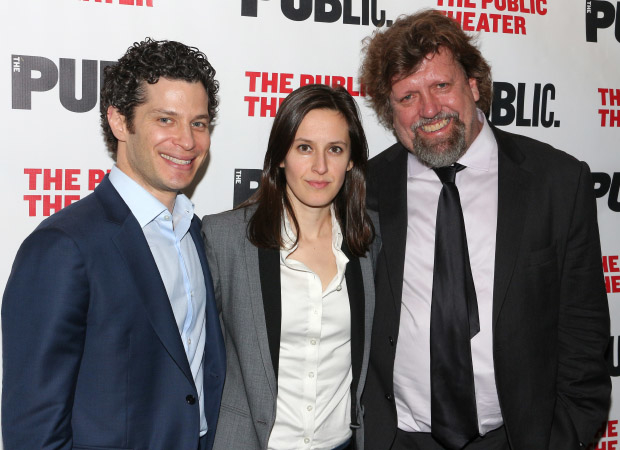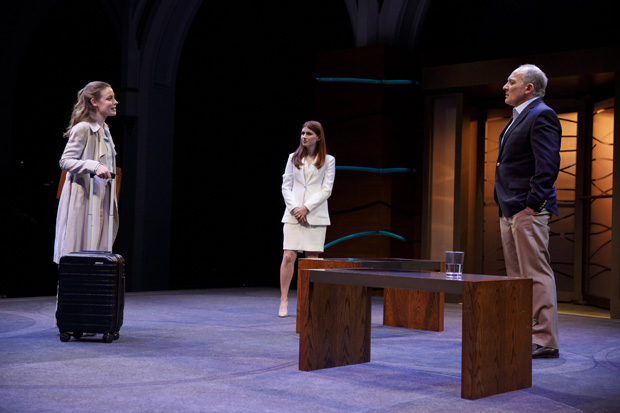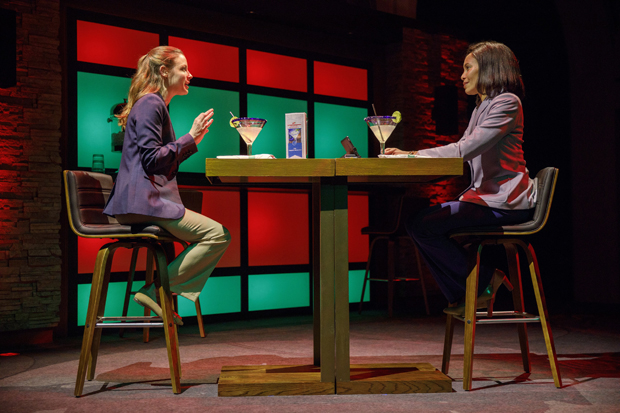Gillian Jacobs and Sarah Burgess Are Kings of the Public Theater
Jacobs, star of TV’s ”Community” and ”Love”, returns to the stage in Burgess’s new play.
Television devotees know Gillian Jacobs from two big roles: Britta Perry (a.k.a. "the worst"), on NBC and Yahoo's cult favorite series Community, and Mickey Dobbs, the self-destructive protagonist of Netflix's Love. But in the early 2000s, the Juilliard grad was an off-Broadway mainstay, appearing in productions like Sarah Treem's A Feminine Ending and Stephen Adly Guirgis's The Little Flower of East Orange.
Two thousand miles away, Sarah Burgess, an NYU film grad from the suburbs of DC, found her interests seguing from the flickers of the silver screen to the footlights of theater. Not interested in easy targets like many of her contemporaries, the bourgeoning playwright discovered that she liked writing in a way that "drops the audience into a situation where they don't necessarily know all the terms." In 2013, she began work on an ambitious play about the American economy, private equity firms, and ethics within the banking industry.

(© David Gordon)
Dry Powder found its way to the Public Theater, where artistic director Oskar Eustis lined up a powerhouse team for a 2016 premiere, including director Thomas Kail, fresh off Hamilton, and an enviable group of actors including Claire Danes and John Krasinski. It was Burgess's first professional production.
Jacobs and Burgess did not know each other when Jacobs read Dry Powder for the first time. But the piece made her jump at the chance to appear in a reading of Burgess's next play, a look into the competitive world of political lobbyists called Kings. Now receiving a full production under Kail's direction at the Public, Jacobs is excited to be returning to her theatrical roots for the first time in a decade, and Burgess is just as enthusiastic about watching her equally ambitious sophomore effort come to life.
Sarah, what was it about the world of Washington, DC, lobbyists and lawmakers that made you think, 'There's a play here'?
Sarah Burgess: When I read about fundraising retreats that lawmakers attend with donors and lobbyists, it struck me that there was potential comedy in that. Something about organized fun at resorts is naturally funny to me.
And the effect of money on the people inside our political system — the way it influences the behavior of lobbyists and politicians — was a topic that drew me in. If Dry Powder is the first play in a trilogy about the way we are shaped by the things we do for money, this ended up being a fitting topic for the second play in that series.

(© Joan Marcus)
Gillian, what do you look for in a theater project? What was it about Kings that you latched onto as an actor after 10 years away from the stage?
Gillian Jacobs: I think I waited 10 years in part because my last production was such a meaningful experience for me. I had always wanted to do a Stephen Adly Guirgis play, and I had always wanted to be part of the Labyrinth Theater Company, and all those things came true. So I got a little hesitant about doing something else until I was sure I could match what that was.
I really wanted to work with Sarah Burgess and Tommy Kail. I had read Dry Powder and really liked that play. I love the language of Sarah's writing. I found Kings entertaining and incredibly fascinating, I cared about the characters, and I learned a lot, but it doesn't feel like you're getting a lesson.
What does doing a play now, at this point in your career, offer you as an actor?
Gillian: Selfishly, I thought Kate was a great character for me. I've played a lot of people who are struggling in their lives, and I liked the idea of playing someone who is professionally successful and struggling with different things. While I do relate to my character on Love and Britta on Community, they're not very close to me as a person. It's not that I am Kate, but… I really enjoy playing a character that wears pantsuits.
Being in a new play and learning something in the afternoon, and then performing it at night is a terror I haven't experienced in a while. But it's good to be scared in this way. I don't want to feel complacent about my job. I wanted to scare myself a bit.
Sarah, what are the challenges of writing a political play in 2018, when the country seems hopelessly divided?
Sarah: The play doesn't really deal with presidential politics, but the instability at the top right now means that the audience may come in with various and intense feelings about Washington. There are references to "a bad time" in there, and there are a couple of jokes about making poor choices as an electorate. But I started writing this play two years ago, during a different administration.
I don't think this is a "hopeful" play, but there is a way of looking at this play (and its subject) that isn't entirely depressing. There really is one thing almost all of us here in the United States agree about: Our campaign finance system has alienated most of us from our representatives. We take it as a given that they are acting on behalf of their donors at least some of the time. Maybe that's inevitable in a capitalist system organized the way ours is organized. And likely no one is ever going to really believe the things politicians say.
But maybe we are united in our anger and frustration about the powerlessness we feel. In a country that feels like it is operating with two different sets of facts, at least we can share that.

(© Joan Marcus)







